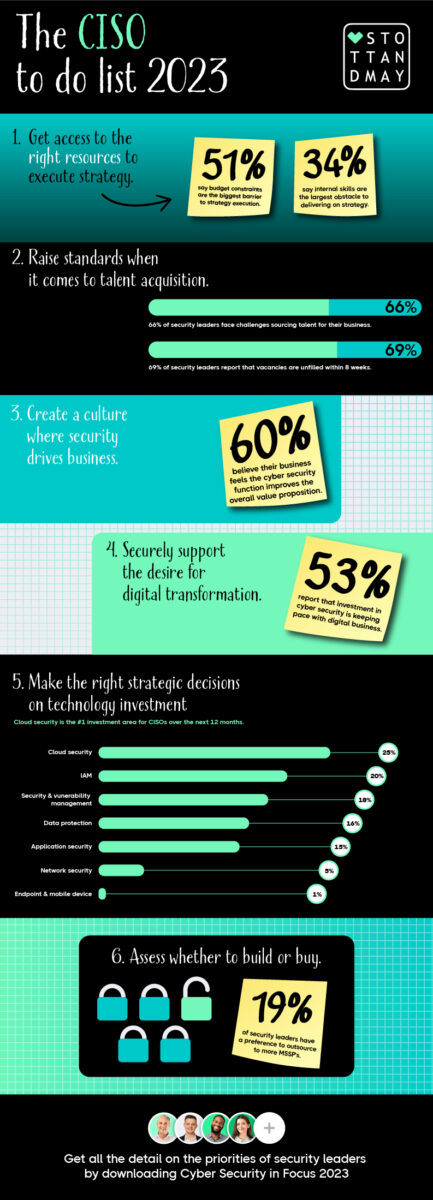Chief Information Security Officers (CISOs) are no strangers to difficulties and constantly shifting environments in the fast-paced field of cybersecurity.
The report “Cyber Security in Focus” by Stott and May for 2023 highlights the complex problems and financial limitations that chief information security officers (CISOs) face.
The interesting finding that 44% of CISOs predict either flat or declining security investments raises doubts about the future of the sector.
The Surge Of Salary Expectations
Growing wage expectations in the cybersecurity space is a major issue contributing to the financial hardship that chief information officers (CISOs) face.

The research reveals the startling finding that 47% of respondents think their salaries have increased by more than 11% in the past year.
Furthermore, another third(31%) reiterates that wage inflation is in the range of 6% to 10%.
The financial strain on companies is increased by the rising salaries and fierce competition for cybersecurity staff.
As employment expenses rise, it becomes more difficult to set aside enough money for critical security efforts.
The Ascending Budget Constraints
One of the most striking discoveries of the year is the notable rise of 16% year over year in the number of CISOs who cite budgetary restraints as their biggest obstacle.
The lack of internal cybersecurity skills has been CISOs’ top issue for the past few years.
But this year, budgetary restraints have taken the crown and are the biggest barrier to carrying out their cybersecurity roadmaps for development.
Persistent Talent Sourcing Challenges
While CISO worries are mostly focused on budgetary restrictions, the sector is perpetually plagued by the difficulty of finding cybersecurity talent.
A startling fact from the research is that 66% of respondents said they encounter significant obstacles when trying to find cybersecurity talent for their companies.
Even more concerning, an exhausting eight-week recruiting procedure has not resulted in the filling of 69% of security job openings.
Priorities For Investments and Budget Realities
CISOs are forced to make strategic investment decisions under the limits of restricted resources due to budgetary constraints.
Remarkably, 44% of the CISOs polled expressed dismay over the fact that their security expenditures will either go down or stay the same in the next year.
Concerns over the industry’s capacity to adapt to the quickly changing threat landscape are raised by this sobering fact.
CISOs are unwavering in their will to make investments in critical cybersecurity areas despite these financial difficulties.
Identity and Access Management (IAM) solutions (20%), cloud security (25%), and security and vulnerability management (18%) are the top three priority investment areas for 2023, according to the research.
Organizations looking to strengthen their security against increasingly complex cyberattacks need these domains badly.
Matching Business Strategy with Security
CISOs are tasked with the vital duty of coordinating security measures with overarching corporate strategy in the face of financial restrictions.

According to the research, 55% of security executives think that cybersecurity is a strategic priority for their organizations.
Remarkably, 60% of respondents agree that the security function improves the value proposition to clients as a whole.
This encouraging change in perception indicates that cybersecurity is becoming more widely seen as a crucial element of corporate success.
CISOs are becoming more and more recognized as guardians of brand reputation and facilitators of corporate expansion.
The Need To Remain Knowledgeable and Flexible
Beyond its quantitative findings, the report offers qualitative insights from leading industry professionals.
Haris Pylarinos, Founder & CEO of Hack The Box, underscores the importance of CISOs remaining outward-looking and ensuring that their internal skills remain up-to-date.
He highlights that the rapidly evolving nature of cybersecurity necessitates continuous adaptation.
“It’s the ability to stay outward looking and ensure that internal skills stay up to date. You can hire the best security professionals out there with field experience, but the problem is that this knowledge can degrade over time because cyber security is evolving at such a rapid pace.”

Summary
CISOs are unwavering in their will to provide priority to vital areas like cloud security, Identity and Access Management (IAM), and vulnerability management despite the aforementioned obstacles.
They also play a crucial part in coordinating security measures with the overall company plan and understanding the strategic importance of cybersecurity in the current digital environment.
CISOs need to be aware, flexible, and connected to the constantly changing cybersecurity landscape in this demanding climate.
They need to do this to manage the financial restrictions and protect their companies from an increasing number of dangers.
Regardless of the financial limitations they face, CISOs continue to play a critical role in protecting organizations as the threat landscape changes.